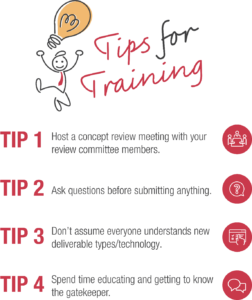Picture the following…
You are running behind schedule……. it’s a Monday afternoon and with soda and laptop in hand, you’re arriving just in time for a 1:30 pm meeting with marketing, sales, and training. In the meeting, you learn of marketing’s new plans and understand from the sales team the needs and objectives for an upcoming sales meeting (or product launch). You leave the meeting energized and excited about the project and tasks at hand. You immediately begin the planning process and brainstorm all of the possibilities and ways to make an impact and drive business. This is an exciting time for the company and all is going as intended. It’s your time to shine and you are thrilled at the opportunity. Once the plan is in place, you work with your preferred vendor to kick-off the project. The first deliverable is soon ready for you to submit to the assigned review committee. And… just like that… slight mood change. The review committee has requested many changes you had not anticipated. You find yourself puzzled and scrambling for ways to improve the submission process. You have a plan you must execute and a timeline to meet. The clock is ticking and no extra time has been calculated for a mountain of changes or rewrites.
Engage all decision makers
Have you ever found yourself in a similar scenario? Whether you are new to training or a new tenured professional, I am certain you have managed through the challenges of creating training. You have found an appreciation for the details that never appear important and yet always seem to cause hiccups in the production process and project timelines.
My goal is to share with you tips that may help you avoid some of the most common pitfalls I have seen training managers make time and time again. It is my belief that by applying four (4) simple tips, you can avoid the frustrations and common pitfalls that arise during the approval process. Based on experience, I have found that gaining internal team alignment and building internal trust and understanding with your team, prior to submitting training deliverables for review and approval, can change the outcome of a project.
When starting your next training project, consider the following tips to help ensure that your approval process stays on time and your training plan is properly executed.

 Tip 1: Host a concept review meeting with your review committee members.
Tip 1: Host a concept review meeting with your review committee members.
As soon as your training plan is in place, be it one that you wrote internally with colleagues or one created by an agency like Aquinas, request a concept review meeting with all review committee members so that you can present your training plan. Ask for a one-hour time block on the day and time already designated by the review committee for your department. This is a key detail because committee members often serve as reviewers for various departments within your organization.
Hosting a concept review meeting has many benefits. The meeting allows you to introduce yourself and/or the agency you have hired to the committee members prior to project kick-off. It provides an opportunity for reviewers to share with you and/or the agency who they are and their role on the committee. It allows you to show the committee examples of the deliverables you intend to submit for approval and to explain how and when they will receive each deliverable in the review system. (For example, number of drafts, what the draft copies will look like, how images will appear etc.) The ultimate goal of the meeting is to gain alignment and mutual understanding of the training plan from everyone involved in the approval process.
 Tip 2: Ask questions before submitting anything.
Tip 2: Ask questions before submitting anything.
If a project has drama, you can bet the drama comes from the details that were missed or never acknowledged. Don’t assume that everyone will understand and visualize your training plan exactly the way that you do. Remember, it is your responsibility to explain the training plan to others and to ensure their understanding and alignment with the plan. Don’t assume that all committee members see your training through the same lens as you. Remember, each member has been assigned a specific role on the committee and will be examining all training materials specifically from their assigned vantage point.
As part of the concept review meeting, make sure to ask questions before submitting anything. Provided are examples of questions you may wish to ask:
- How much time do you prefer/need when reviewing a _______ piece? (remember different deliverable types vary in both page length and complexity)
- Do you have specific referencing preferences you wish to be followed?
- What do you mean when you use the term ‘global changes’ in your comments? Does it mean to pull the changes noted in your comment throughout all deliverables being created for the training or just within the deliverable that is currently under review?
- When resubmitting a piece for additional review, do you wish for special annotations to be applied, specifically noting the location where changes have been made and comments addressed?
 Tip 3: Don’t assume everyone understands new deliverable types/technology.
Tip 3: Don’t assume everyone understands new deliverable types/technology.
New technology, of any kind, can be shocking and scary to some. For example, if creating product modules, you may wish to move from a standard PDF format to the new Aquinas Interactive Modules (A.I.M.s). Arguably, this change can be exciting and a new way to learn for your sales team. However, make sure to introduce this new format to your review committee before starting the development so that they can prepare and allow additional time for review if needed.
As part of the introduction, show reviewers an example of the end product. Explain the submission process and how the deliverable will look/be submitted to them when in draft form. Point out the different looks of the deliverable at the beginning stages and how it will evolve throughout the approval process.
Allow and encourage the committee to ask questions and make sure everyone involved truly understands.
 Tip 4: Spend time educating and getting to know the gatekeeper.
Tip 4: Spend time educating and getting to know the gatekeeper.
Take time and get to know your designated review coordinator. Most review committees have a designated coordinator who serves as the gatekeeper. This individual is very important and can serve as a critical partner to you throughout the approval process. Coordinators understand the submission system (such as Veeva) and have knowledge of each reviewer’s schedules, understands their workloads, and can serve as an advocate for you. Educate them on your training plan and the goals that you are trying to achieve.
Join the conversation
Based on your own experiences, what tips can you add? What are some best practices you employ to rally your internal review committee members to gain internal strategy alignment?
We would love to hear from you!
Join the conversation by visiting LinkedIn. Share tips you have found successful in your own organization.
If you would like more information from Aquinas about this topic, contact: ideasforyou@aquinaslg.com.


